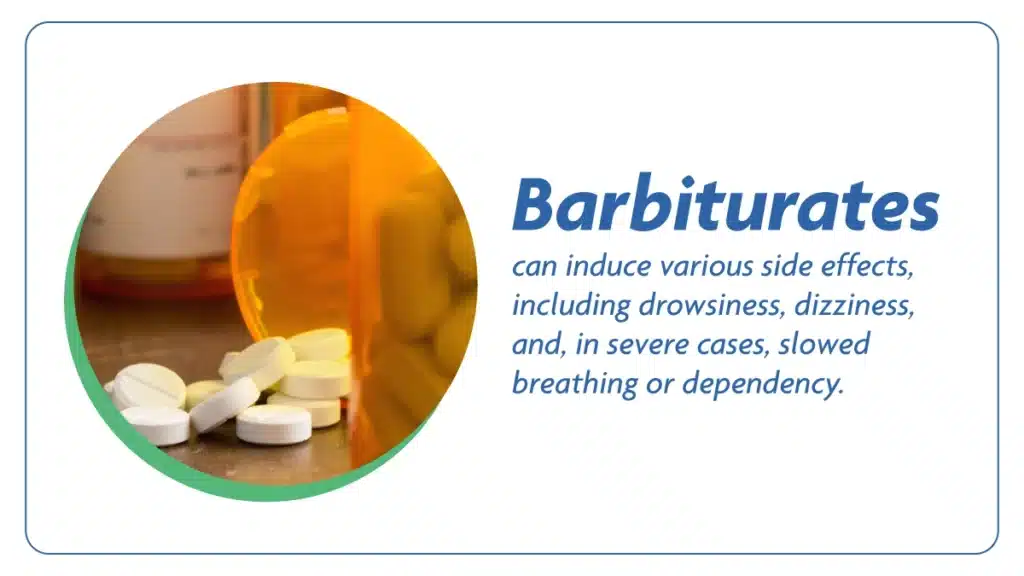Barbiturates are a class of drugs known for their sedative-hypnotic properties, commonly prescribed to treat conditions such as anxiety, insomnia, and seizure disorders. These medications act on the central nervous system (CNS), depressing its activity and promoting relaxation.
However, these medicines have primarily been replaced by safer alternatives due to their high potential for addiction and overdose. This article will delve into these side effects of barbiturate use, highlighting the importance of cautious and monitored consumption.
Key Takeaways
Barbiturates are prescription drugs used for seizures, anxiety, and sleep disorders, but they come with side effects. Here is what you need to know:
- Barbiturates can cause various side effects, from common ailments to long-term severe impacts.
- Stopping barbiturates suddenly after regular use or significantly reducing the dosage can result in severe withdrawal symptoms.
- Overdosing on barbiturates can lead to severe symptoms and, in extreme cases, can be life-threatening.
Contact our teen treatment center at (845) 479-6888 for dedicated support to help your teen recover from substance use disorder (SUD).

What Are Barbiturates?
Barbiturates are a group of drugs that act as central nervous system depressants. They were once commonly used for medical purposes, such as sedation, anesthesia, and the treatment of insomnia and anxiety disorders. However, their use has declined in recent years due to the development of safer alternatives with fewer side effects and a lower risk of physical dependence.
Barbiturates work by boosting the activity of the neurotransmitter gamma-aminobutyric acid (GABA) in the brain. GABA, an inhibitory neurotransmitter, reduces brain activity and produces a calming effect. By increasing GABA activity, barbiturates depress the central nervous system, leading to sedation and a decrease in anxiety.
These drugs are different types of barbiturates, including short-acting, intermediate-acting, and long-acting ones. Short-acting barbiturates, like pentobarbital and secobarbital, are used for insomnia, while long-acting barbiturates, such as phenobarbital, are used for seizure control.
Despite their medical uses, barbiturates pose several health risks. They have a narrow therapeutic index, meaning there is a small difference between a therapeutic dose and a lethal dose. In addition, they can lead to physical and psychological dependence, tolerance, and overdose.
Due to these risks, barbiturates are now largely replaced by safer alternatives such as benzodiazepines and non-benzodiazepine medications for the treatment of anxiety and insomnia, as well as other meds for anesthesia and seizure control.
Impact of Barbiturates: Exploring Side Effects
Barbiturates, while helpful in treating specific conditions, can come with various side effects. Here is a breakdown of these adverse effects:
Common Side Effects of Barbiturates
Barbiturates may result in several common side effects that individuals might experience during their use.
- Drowsiness and Sedation: Barbiturates are known for their sedative effects, leading to drowsiness and a feeling of relaxation.
- Lightheadedness: Some individuals may experience a sensation of lightheadedness or dizziness.
- Impaired Coordination: Barbiturates can affect motor skills, leading to poor coordination or clumsiness.
- Nausea and Vomiting: Gastrointestinal disturbances can occur, including nausea and vomiting.
- Hangover Effect: Individuals may experience a “hangover” effect characterized by residual drowsiness and grogginess the day after taking the medication.
- Mood Changes: Barbiturates can influence mood, leading to changes such as depression or euphoria.
- Cognitive Impairment: These drugs of abuse can impair cognitive function, affecting memory, attention, and concentration.
Serious Side Effects of Barbiturates
Barbiturates can also lead to severe and potentially life-threatening side effects that necessitate careful monitoring and medical attention.
- Tolerance: Individuals may develop tolerance over time, needing higher doses to achieve the same therapeutic effect.
- Drug Dependence and Addiction: Barbiturates have a high potential for physical and psychological dependence, and misuse can lead to addiction.
- Respiratory Depression: In high doses or with prolonged use, barbiturates can cause severe respiratory depression, which can be life-threatening.
- Hypersensitivity Reactions: Some people may experience allergic reactions to barbiturates, manifesting as skin rash, itching, or swelling.
- Hematologic Effects: Long-term barbiturate use can impact blood cell production, leading to medical conditions such as agranulocytosis (a severe reduction in white blood cells).
- Liver Damage: Long-term use of barbiturates may result in liver damage, although this is relatively rare.
- Drug Overdose: Taking too much of a barbiturate can result in an overdose, leading to coma or even death.
If you have concerns about the use of barbiturates or are experiencing side effects, it is crucial to consult with medical professionals for guidance.
Barbiturates Withdrawal
When someone who has been using barbiturates regularly suddenly stops or significantly reduces their dosage, they may experience withdrawal symptoms. Withdrawal from barbiturates can be severe and, in some cases, life-threatening due to the impact of these drugs on the central nervous system (CNS).
Symptoms of barbiturate withdrawal may include:
- Anxiety: Feelings of nervousness, restlessness, and unease.
- Insomnia: Difficulty falling asleep or staying asleep.
- Tremors: Shaking or trembling of the hands or other parts of the body.
- Sweating: Profuse sweating even in normal conditions.
- Nausea And Vomiting: Gastrointestinal symptoms like nausea, vomiting, and diarrhea.
- Hallucinations: Seeing, hearing, or feeling things that aren’t there.
- Seizures: Convulsions, altered consciousness, and unusual behaviors.
- Delirium: Confusion, disorientation, and altered mental states.
- Changes In Cardiovascular Function: Elevated heart rate and blood pressure.
- Respiratory Distress: Difficulty breathing or irregular breathing patterns.
The severity and duration of withdrawal symptoms can vary based on factors such as the dosage of barbiturates used, the duration of use, individual physiology, and whether the person has any underlying health conditions.
Never attempt to stop taking barbiturates or any other medication without consulting a healthcare professional, as abrupt discontinuation can be dangerous. Withdrawal from these substances should be managed under the care of a qualified medical practitioner or within a specialized treatment facility.
Barbiturate Overdose
A barbiturate overdose occurs when an individual takes more than the prescribed or recommended amount of barbiturate medications, leading to toxic levels in the body. Overdosing on barbiturates can lead to severe symptoms and, in an extreme case, can be life-threatening.
Some common symptoms of a barbiturate overdose include:
- Confusion and Disorientation: The individual may appear confused, disoriented, or have trouble understanding things happening around them.
- Slurred Speech: Barbiturates can affect speech patterns, causing slurred or incomprehensible speech.
- Lack of Coordination: Motor skills may be significantly impaired, leading to stumbling, unsteady gait, or inability to control movements.
- Extreme Drowsiness: Overdosing on barbiturates often causes profound drowsiness or even unconsciousness.
- Slowed Breathing: Barbiturates depress the respiratory system, leading to slow, shallow breathing or even respiratory arrest.
- Hypotension (Low Blood Pressure): The overdose can result in dangerously low blood pressure, leading to dizziness, fainting, or shock.
- Weak Pulse: The heart rate can become weak and irregular.
- Coma: In severe cases, an overdose can lead to a coma, where the individual is unresponsive and unaware of their surroundings.
- Death: An extremely high overdose of barbiturates can be fatal due to respiratory failure, cardiovascular collapse, or severe central nervous system depression.
A barbiturate overdose can be an emergency requiring immediate medical attention. If someone is suspected of overdosing on barbiturates, it’s crucial to seek medical help right away by calling medical emergency services. Additionally, while waiting for help, try to keep the individual awake and monitor their breathing.
Frequently Asked Questions (FAQ)
Can barbiturates cause depression?
Yes, barbiturates can potentially lead to depression as a side effect, affecting mood and causing feelings of sadness or low energy in some individuals.
Why do people take barbiturates?
People take barbiturates to treat conditions like seizures, anxiety, and sleep disorders, as these medications help in calming nerves, inducing relaxation, and promoting sleep when prescribed by a doctor.
What is the greatest danger associated with barbiturates?
The greatest danger associated with barbiturates is the high risk of overdose, which can lead to life-threatening symptoms such as severe drowsiness, slowed breathing, unconsciousness, and even death if not addressed promptly.
What is a barbiturate?
A barbiturate is a type of drug that affects the central nervous system (CNS) and is used to treat conditions like seizures, anxiety, and sleep disorders by slowing down brain activity and inducing relaxation or sedation.
Helping Teens on the Path to Wellness
Our specialized teen treatment center offers dedicated support for your child’s recovery journey. Our caring team of healthcare providers is here to guide them every step of the way.
Our residential treatment program is tailored for teens and incorporates various therapeutic methods. From one-on-one counseling to group and family therapy, educational workshops, and engaging activities like art and music therapy, we provide a holistic approach to healing.
Don’t wait another moment to make a life-changing decision. Call us today at (845) 479-6888 to give your teen the help and support they deserve


